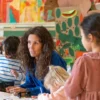![From Playtime to Prime Time: How Mt. Juliet Day School Shapes Bright Futures Introduction: The Early Years as a Defining Chapter in Human Development The early years of a child’s life are not a preface—they are the prologue and the blueprint. During this […]](https://dayschools.org/mtjuliet/wp-content/uploads/sites/6/2024/03/day-school-2.webp)
Table of Contents
Introduction: The Early Years as a Defining Chapter in Human Development
The early years of a child’s life are not a preface—they are the prologue and the blueprint. During this fleeting yet profound window of time, children are not only learning about the world around them—they are forming the core architecture of their brains, their identities, and their approach to life itself. Neurological research confirms that more than 90% of brain development occurs before the age of five. Synaptic connections form at astonishing speed, shaping how children process information, regulate emotions, and engage socially.
This extraordinary plasticity presents both opportunity and responsibility. The experiences children have in these years are not just meaningful in the moment—they are foundational for everything that follows. Language acquisition, executive functioning, emotional regulation, and social competence are being formed concurrently, influenced by the environment, the adults around them, and the learning opportunities provided.
Mt. Juliet Day School understands this critical truth. Its approach to early childhood education is not reactive but deliberate—designed to harness this phase of optimal growth. Here, each moment is seen as a chance to nurture emerging intellect, guide emotional expression, and deepen social understanding. Through a rich blend of purposeful play, intentional curriculum, and deeply empathetic relationships, Mt. Juliet Day School creates a developmental ecosystem that cultivates bright futures from the very beginning.
The Mt. Juliet Philosophy: Whole-Child Education Rooted in Research
At the core of Mt. Juliet Day School’s approach is a profound respect for the entirety of the child. Rather than viewing education as the transmission of facts or the achievement of narrowly defined milestones, the school embraces a broader and more impactful mission: to develop each child as a fully integrated human being.
This whole-child philosophy is not ideological—it is research-driven and pedagogically sound. Leading studies in developmental psychology, neuroscience, and early education affirm that children flourish when their learning environment supports not just academics, but emotional safety, physical growth, and social belonging. Mt. Juliet Day School draws from this body of research to design learning experiences that are intellectually engaging, emotionally resonant, and physically energizing.
Classrooms are structured as responsive environments where each element—furniture placement, lighting, materials, language used—is intentionally chosen to encourage inquiry and comfort. Daily routines create predictability and security, while varied activities provide stimulation and choice. Children are given the space to lead, the tools to explore, and the relationships to feel grounded.
Equally significant is the school’s commitment to balancing structure and freedom. Children are given opportunities to express themselves creatively, explore their interests, and make decisions, while also developing self-discipline, focus, and accountability. It’s a delicate dance—one that Mt. Juliet educators perform with remarkable skill.
Through this holistic and responsive model, Mt. Juliet Day School ensures that education is not a series of disconnected tasks, but a cohesive journey that meets the full spectrum of a child’s developmental needs. In doing so, the school honors not only what each child is today—but who they are becoming.

The Science of Play: Where Exploration Becomes Cognitive Mastery
Play is not ancillary to learning—it is learning, especially in the earliest stages of development. At Mt. Juliet Day School, play is elevated to its rightful place as a cornerstone of cognitive development. It is understood as the child’s primary medium of communication, experimentation, and meaning-making. Every playful interaction becomes a laboratory of thought, where hypotheses are tested, problems are solved, and new ideas are born.
Children are encouraged to explore, build, imagine, and narrate within thoughtfully prepared environments rich in open-ended materials. In block play, they intuitively grapple with balance, measurement, and spatial relationships—key principles of engineering and mathematics. In dramatic play, they step into different roles, weaving together narrative structures, exploring social dynamics, and expanding vocabulary.
Educators at Mt. Juliet Day School are not passive observers in this process. They act as intentional facilitators, tuning into children’s interests and skill levels, and subtly guiding play to deepen learning. A question, a prompt, or a new material might be introduced at just the right moment to extend a child’s inquiry or challenge their thinking.
Through this deliberate balance of freedom and structure, play becomes an engine for mastery. Children build working memory, strengthen self-regulation, and enhance abstract thinking—all while engaged in what feels natural and joyful. It is through these moments of purposeful play that the groundwork is laid for academic achievement and intellectual agility.
Emotional Development: Teaching Children to Navigate Their Inner Worlds
Understanding and managing emotions is a skill as vital as reading or arithmetic. At Mt. Juliet Day School, emotional development is integrated into the daily experience, not as an add-on, but as a fundamental part of shaping a balanced learner and whole human being.
Children are given the language and tools to understand their feelings—from frustration and excitement to confusion and joy. Using visual aids, storytelling, and guided conversations, students begin to identify emotions, name them accurately, and recognize their physiological cues. This process of naming and normalizing feelings reduces fear and frustration, giving children a greater sense of control and self-awareness.
Classroom routines are infused with emotional check-ins and mindfulness practices. Reflection circles, quiet corners, and sensory activities help children develop the capacity to self-soothe and recalibrate. Emotional upsets are treated not as disruptions to be silenced, but as opportunities for learning and growth.
Educators model emotional intelligence through calm, empathetic interactions and help children navigate conflict with integrity and care. Rather than focusing solely on behavioral compliance, the school emphasizes emotional insight—teaching children why they feel what they feel, and how to respond constructively.
By developing this internal compass early on, Mt. Juliet students are not only better equipped to handle interpersonal challenges but are also more open to learning, more empathetic in their relationships, and more resilient in the face of adversity.
Social Intelligence: Building Community, Character, and Compassion
Human connection is at the heart of every meaningful learning experience. Mt. Juliet Day School nurtures this truth by cultivating an environment where social intelligence is actively developed through practice, conversation, and reflection.
From the moment children arrive, they are immersed in a culture of respect, inclusion, and shared responsibility. The classroom becomes a microcosm of community life, where cooperation is not just encouraged—it is essential. Whether working on a collaborative art project, sharing materials, or resolving a playground dispute, students learn how to navigate relationships with kindness and clarity.
Teachers support social learning with the same intentionality given to academic subjects. They guide children in taking turns, reading social cues, and interpreting the perspectives of others. Structured social games, peer interviews, and group storytelling sessions foster the habits of listening, articulating needs, and compromising.
Conflict, when it arises, is addressed through restorative practices that emphasize accountability and empathy. Children are not punished into obedience; they are coached into understanding. This approach builds moral reasoning, deepens emotional intelligence, and reinforces a culture of mutual care.
In developing strong social skills early, Mt. Juliet Day School empowers its students to be not just successful learners, but conscientious citizens—capable of meaningful collaboration, thoughtful leadership, and authentic human connection.

Physical Literacy: Merging Movement with Learning and Wellness
Young children are not meant to sit still for long. Their bodies are hardwired to move, and Mt. Juliet Day School embraces this biological truth by embedding physical activity into the very fabric of its daily schedule. Movement is not isolated to recess or gym time—it is a continuous, deliberate part of the learning experience.
Gross motor activities such as running, climbing, balancing, and jumping are incorporated into outdoor exploration and structured physical education. These activities not only build strength and coordination, but also improve spatial awareness, proprioception, and the neural connections that support higher-order thinking. Fine motor development is cultivated through hands-on tasks like cutting, painting, stringing beads, and sculpting—preparing children for tasks such as writing, buttoning, and tying.
The curriculum also includes practices like yoga and dance, which promote flexibility, rhythm, body awareness, and self-regulation. These mindful movement activities help children tune in to their bodies, control their energy levels, and find calm when needed.
Physical literacy at Mt. Juliet Day School extends beyond motion. Children are taught the principles of health and wellness—understanding nutrition, learning about hydration, and practicing hygiene habits that form the foundation of lifelong self-care. This integration of movement, knowledge, and habit creates children who are not only physically capable but who develop a genuine respect for their bodies and wellbeing.
Personalized Instruction: Adapting to Diverse Learners and Interests
Children arrive in the classroom with a tapestry of learning styles, developmental paces, interests, and life experiences. At Mt. Juliet Day School, this diversity is not seen as a challenge—it is embraced as an opportunity to elevate each learner through personalized instruction.
Educators begin with deep observation, noting how each child engages with tasks, solves problems, interacts with others, and expresses curiosity. These insights are coupled with formative assessments that inform a responsive and flexible instructional strategy. Teachers then adjust content delivery, learning modalities, and classroom roles to ensure that every child is challenged appropriately and supported consistently.
A child who learns best through movement might explore math by hopping out patterns on the floor. Another who is visually inclined may use diagrams or color-coded charts to understand new ideas. Auditory learners might be encouraged to process information through discussion or song. Each child is met where they are—not to keep them comfortable, but to give them the scaffolding needed to reach the next level.
This tailored approach does more than boost academic performance. It fosters intrinsic motivation, cultivates self-awareness, and promotes a sense of agency. Children learn to take pride in their progress, not in comparison to others, but in the context of their own journey. The result is not just achievement—but empowerment.
STEAM in the Early Years: Laying the Groundwork for Innovation
The seeds of innovation are planted early, and at Mt. Juliet Day School, the soil is rich with opportunity. STEAM—Science, Technology, Engineering, Arts, and Mathematics—is not treated as a set of advanced subjects reserved for later years. It is presented as an integrated, hands-on, and exploratory experience from the very beginning.
Science emerges through nature walks, weather investigations, and simple experiments that encourage children to observe, hypothesize, and draw conclusions. Technology is introduced in age-appropriate ways through interactive tools that teach sequencing, logic, and digital expression. Engineering is brought to life through building challenges and problem-solving tasks that involve design, planning, and iteration.
Mathematics is embedded in daily routines—measuring ingredients in cooking projects, creating symmetrical art, or recognizing patterns in music. The arts—visual, musical, dramatic, and kinesthetic—are not supplementary; they are essential, enhancing creativity and bringing STEAM concepts to life through imagination and self-expression.
This interdisciplinary approach cultivates flexible thinking, curiosity, and perseverance. Children learn not just to absorb information, but to question, invent, and reimagine. In these moments, they are not passive learners—they are architects of understanding.
Mt. Juliet Day School’s early exposure to STEAM disciplines ensures that students are prepared for a world that demands not only knowledge, but innovation. They leave with the foundational mindset of thinkers, creators, and problem-solvers—ready not just for the future, but to lead it.

Exemplary Educators: The Human Catalyst Behind Every Learning Milestone
Behind every moment of discovery, every breakthrough in confidence, and every spark of curiosity at Mt. Juliet Day School stands a dedicated educator. These professionals are more than teachers—they are the human catalyst that transforms curriculum into connection, and learning into lasting growth.
Every member of the faculty is deeply grounded in the principles of early childhood development. With formal training, classroom experience, and a commitment to lifelong learning, they bring both expertise and emotional intelligence to their role. But what truly distinguishes them is their passion—for the work, for the process, and above all, for the children.
Educators at Mt. Juliet understand the complexity of balancing structure with flexibility. They know when to let a child explore independently, and when to step in with support. They anticipate developmental needs before they arise and craft individualized responses that meet children with both empathy and purpose.
Ongoing professional development is woven into the culture of the school. Teachers collaborate, reflect, and refine their practice through peer mentoring, workshops, and engagement with the latest research. This continuous growth ensures that the learning environment remains dynamic, responsive, and aligned with best practices.
Their presence is more than instructional—it is foundational. With their guidance, children are not only taught but truly seen, heard, and celebrated. These educators cultivate trust, model compassion, and ignite the inner drive that powers lifelong learning.
Family-School Partnerships: Aligning Home and Classroom for Maximum Growth
A child’s development does not exist in silos. It is the product of interconnected environments, with school and home acting as twin pillars of support. Mt. Juliet Day School understands that meaningful, sustained growth requires alignment between educators and families, and it fosters these partnerships with care and intention.
Communication is transparent and consistent. Parents receive regular updates on their child’s progress through digital portfolios, narrative reports, classroom observations, and scheduled conferences. These touchpoints provide not just academic data but rich insights into the child’s social, emotional, and cognitive journey.
Beyond communication, families are invited into the life of the school. Classroom visits, volunteer opportunities, and school-wide events create a sense of shared purpose and community. Parental voices are not only heard—they are valued in decision-making processes that affect the classroom environment and individual learning paths.
The goal is continuity. When expectations, routines, and values are mirrored across home and school, children feel secure, understood, and supported. This alignment enhances learning outcomes, minimizes behavioral challenges, and deepens emotional well-being.
At Mt. Juliet Day School, the family-school partnership is not a courtesy—it is a cornerstone. It ensures that each child is surrounded by a unified team committed to their success, both academically and personally.
Kindergarten Readiness: Seamless Preparation for the Next Educational Stage
The transition from preschool to kindergarten is a momentous step in a child’s academic journey—one that must be handled with deliberate preparation and care. At Mt. Juliet Day School, kindergarten readiness is not an afterthought; it is a continuous, integrated process that begins the moment a child enters the classroom.
The curriculum is carefully scaffolded to introduce key academic concepts in literacy, mathematics, and science in developmentally appropriate ways. Phonemic awareness, letter recognition, early numeracy, sequencing, and pattern recognition are taught through playful, hands-on experiences that build both competence and confidence.
Just as important as academic readiness is the development of executive function. Children are gradually introduced to routines, time management, multi-step tasks, and the ability to focus for longer periods. These skills—planning, remembering, self-monitoring—are vital for success in more structured elementary environments.
Emotional and social preparedness are equally prioritized. Children learn how to express needs respectfully, take turns, follow directions, and adapt to changing expectations. Through peer interactions and guided reflection, they cultivate the resilience and adaptability required for new classroom dynamics.
By the time students leave Mt. Juliet Day School, they are not merely prepared for kindergarten—they are eager for it. They carry with them not only academic knowledge, but the confidence, curiosity, and emotional maturity to embrace new challenges with optimism and enthusiasm. The foundation has been laid—not just for school success, but for a lifelong love of learning.
Conclusion: Shaping Capable, Curious, and Confident Lifelong Learners
At Mt. Juliet Day School, education is not defined by textbooks or test scores—it is defined by transformation. Every element of the school’s philosophy and practice converges on a singular goal: to shape young learners who are not only school-ready, but world-ready.
By honoring the whole child—intellectually, emotionally, socially, and physically—Mt. Juliet crafts an environment where each learner is empowered to thrive. Play is not a break from learning; it is its most potent form. Inquiry is not reserved for later years; it is encouraged from the first day. Students are given the tools to ask, explore, create, and understand, all within a nurturing framework that fosters both confidence and compassion.
Educators here are more than teachers—they are the architects of potential. Parents are more than observers—they are partners in progress. And children are never viewed as incomplete—they are respected as active participants in their own development.
From circle time discussions to collaborative art projects, from emotional check-ins to STEAM experiments, every moment is intentional. Every lesson is layered with meaning. Every interaction affirms the belief that each child is capable of greatness.
As they leave the halls of Mt. Juliet Day School, students carry with them far more than academic knowledge. They possess a sense of self-worth, a hunger to learn, and a readiness to contribute. They step forward not just as students, but as thinkers, explorers, creators, and leaders.
Mt. Juliet Day School doesn’t just prepare children for what comes next. It equips them to shape what comes next—with confidence, curiosity, and a boundless sense of possibility.






